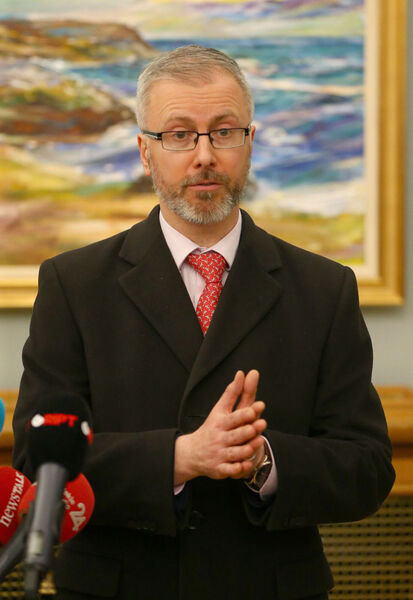Fr Liam Power: Referendums on International Women’s Day: tokenistic reform?

Young affectionate female kissing cute baby son on hand of her husband in the morning while saying goodbye and leaving for work
We, as citizens of Ireland, are being asked to vote in two Referendums on March 8, one to change the definition of family (The Family Amendment) and the other to delete the reference to the importance of the role of the mother in the home and the duty of the state to ensure that she is not obliged by economic necessity to work outside the home (The Care Amendment).
This will be replaced by a wording, which recognises other family members (as well as mothers) as caregivers and that such care gives to society a support “without which the common good cannot be achieved, and shall strive to support such provision.”

Offering a brief reflection on the proposed amendments, I would like to begin by outlining briefly the Catholic, or more generally, the Christian approach on deciding how to vote.
'I think there would be universal agreement that a stable home is the most important foundation for the emotional and spiritual development of children'
The Irish Episcopal Conference, when issuing statements on issues pertaining to law and morality, respect the principle that, in moral matters, people should not be forced to act against their conscience nor should they be restrained from behaving according to conscience provided the just requirements of public order are observed.
In their statements, the Irish bishops generally embody an affirmation of the right and responsibility of each voter to make up their own mind but they also include a clear statement of the conference’s preferred position. They recognise the principle that the Catholic tradition does not enjoin the prohibition of immoral behaviour by law in many circumstances.
The bishops generally respected the relative autonomy of secular affairs. They certainly argued strongly against positions, which they believed would compromise the common good; but they recognised the legitimacy of differences of opinion and respected the fact that the enforcement of morals by the law was not an exact science and becomes more complicated the more specific and concrete the action specified.
For example, we all agree that we should act justly and the law should support the rights of people to be treated justly. But when it comes to specifics there can be huge diversity of opinion as to what constitutes justice for people.
The Episcopal Conference has not yet issued a statement on the March referendum. I would like to offer this reflection, which will be guided by the methodology followed by the Irish Bishops.
The Church teaching on family is well known and reiterated in Pope Francis's document on “The Joy of Love”, clearly affirming that the family is based on marriage. The referendum proposes to change the definition of family to one based on durable relationships, the argument being that the current definition excludes other one parent families and cohabiting couples.

Personally, I have great admiration for one parent families. I see the struggle and the sacrifices made by lone parents to ensure the wellbeing of their children. But if the referendum is passed, I fear that lone parents, who are not in a durable relationship, will still be discriminated against.
So many commentators have pointed out the legal minefield that the vague and ill-defined concept of ‘durable relation’ poses for the lawmaker. Michael McDowell has listed a number of areas in which constitutionally extending the definition of marriage to include durable relationships could have unintended consequences, such as in areas of family law, immigration law, tax law, inheritance law.
Minister Roderic O’Gorman has failed to give a definitive answer as to whether or not the concept of durable relationships might include polygamous marriages or polyamorous arrangements. The lack of pre-legislative scrutiny has been condemned by many.

In relation to the proposed deletion of article 41.2 .1 and article 41.2.2, (the family amendment), whilst admitting that the language is somewhat outdated, I will admit that I would be opposed to eliminating the one reference to mothers in the constitution. It recognises the unique role of motherhood in bringing children to birth and in providing nurturance and support during the early years of development. It also offers protection to a woman in the case of divorce or separation in that a husband, who is in a position to support his wife, could not force her to go out to work to earn extra money if she opts to stay at home to support the children.
A recent survey by Amárach Research found that 69 percent of mothers with school-age children would prefer to stay at home with their children rather than go out to work if they could afford it. In addition, it found 76 percent of mothers said that women who work in the home are undervalued by society, compared with women who work outside the home, and over 70 percent of mothers do not feel valued by society for their work as mothers. I think there would be universal agreement that a stable home is the most important foundation for the emotional and spiritual development of children.
I appreciate that fathers sometimes opt to stay at home to rear children because of economic circumstances or because of bereavement or of separation etc. Rather than delete reference to mothers, an additional wording could be added to recognise the contribution of stay at home fathers or other carers.
There is considerable level of opposition to the proposed wording of the Care amendment. The wording of 42.B gives constitutional expression to the conservative holding that the primary responsibility for care resides within the family (and not the wider community) and omits any reference to a right to care and that state support for carers is not legally enforceable. For most commentators, it does not go far enough.
The Irish Council for Civil Liberties and the Independent Living Movement Ireland have basically endorsed the critique of Flac (Free Legal Advice Centres), which claimed that the Care amendment was “ineffective, implicitly sexist and potentially compromising of the rights of people with disabilities”.
The Irish Constitution guarantees a series of important rights and freedoms of citizens. Any amendment to the Constitution must be given due consideration, which should include pre-legislative scrutiny and open debate in the Oireachtas. I don’t believe any of these conditions have been met. I believe both amendments are ill-conceived and somewhat rushed. The issues deserve greater deliberation.






